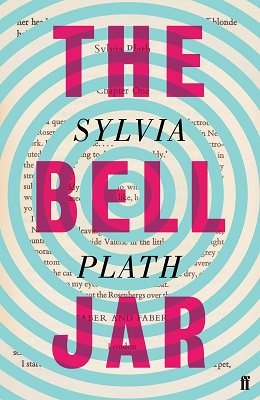The Bell Jar by Sylvia Plath
 I was convinced that I read The Bell Jar in my mid-teens, and that this time around I'd be re-reading it as an adult. Upon starting it, I soon realised that I hadn't actually read it at all, although I knew quite a lot about it and am familiar with Sylvia Plath's poetry.
I was convinced that I read The Bell Jar in my mid-teens, and that this time around I'd be re-reading it as an adult. Upon starting it, I soon realised that I hadn't actually read it at all, although I knew quite a lot about it and am familiar with Sylvia Plath's poetry.Still, I'm glad I've now read it and sorry that I didn't read it before, because it's excellent, and despite the subject matter (which includes severe mental illness and a lot of discussion of suicide, so if these are things you know will be upsetting for you to read about, do proceed with caution) actually surprisingly entertaining. I fully expected to finish this book and feel slightly depressed by it, and all I can say is that I really didn't.
The main character, Esther Greenwood, is a college student from middle-class Boston who aspires to become a writer, and has been selected for a summer internship programme at Ladies' Day, an up-market women's magazine in New York. It's 1953, and the interns are treated like a cross between debutantes and pupils at an elite boarding school, housed in a single-sex hotel, sent en masse to society events and given identical make-up sets to wear. On the face of it, the parties, dinners and camaraderie, not to mention the general buzz and sophistication of 1950s New York, sound incredibly glamorous, but Esther is curiously detached from the excitement, observant but dispassionate. Her experiences are always tarnished or disappointing, the impressions of those she meets are largely negative, and she seems to be taking ill-calculated risks. A lavish lunch - at which Esther seems to be somewhat compulsively over-eating - ends in all the interns being taking severely ill with food poisoning. A country club party Esther attends with her wild, cynical colleague Doreen ends in an attempted rape.
Perhaps the best-known part of the novel is Esther's descent into a severe depressive episode - which might have been preceded by a manic phase; her diagnosis is unclear - that sees her sent back to Boston to live with her mother, and ultimately to a psychiatric hospital, where her treatment is punishingly drastic. The novel is largely autobiographical and Plath describes Esther's state of mind and the suffocating fog of depression with exceptional clarity and accuracy, and the book has a reputation as being a favourite among young, angsty women. And of course, reading The Bell Jar knowing that Plath later took her own life - and did so after a painfully difficult marriage to Ted Hughes, who hurt her very deeply - does make some of what the book describes, including the way that Esther feels about men as well as her mental breakdown, all the more poignant.
And yet what people rarely tell you about The Bell Jar is that it's also really quite funny. Esther's honesty as a narrator, her wry detachment and her writer's eye for detail make for a sharp, witty, narrative. It can't be denied that there are many dark moments, and life under 'the bell jar', as Esther refers to her depression and the way it closes her off from the world around her, is painfully difficult. But Esther is so frank and articulate, and has such a keen sense of the absurd and the grotesque, that the book doesn't, to me, feel anything like as bleak as expected. It never descends into melodrama - even bizarre or traumatic incidents are described with an eloquent calmness, almost flippancy.
And it's also surprisingly, dare I say it, quite glamorous. There was some dissent among Plath fans when an edition of The Bell Jar was brought out with a cover that showed a woman applying lipstick in a 1950s compact mirror, as if that trivialises Plath's serious work and the strong feminist message that runs throughout as Esther contemplates the limits that being female places on her life choices. But in fact, this is a book set in a glamorous world, and Esther talks a lot about clothes, and makeup, and appearances - what they conceal, what they reveal, and how they can both empower and oppress.
Plath was, of course, well-known as a poet, and every word, every description, every metaphor and simile in The Bell Jar has been chosen with incredible care - and yet it's an effortless read, and one which I'm sure I'll return to again.
Comments
Post a Comment